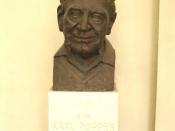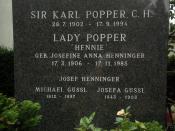Casey Fagerstrom
Period 6
The modern meaning of science was heavily influenced by two very important people, Karl Popper and Thomas Kuhn. They were both very significant people in the development of modern day science. Although they came up with their definitions in the early twentieth century, we still use their theories today. Popper and Kuhn are both extremely famous philosophers but they didn't have exactly the same definition of scientific theory, although they both contributed ideas to the modern meaning.
Karl Raimund Popper was born on 28 July, 1902 in Vienna, and he graduated from the University of Vienna with a PhD in philosophy. Popper is regarded as one of the best philosophers of the twentieth century. His study of the scientific method spanned from 1938 to 1963. Popper's main contribution to the scientific method is the method of falsification. His idea was that you formulate your hypothesis, try to prove it wrong, and from your results, form a new hypothesis.
Popper stated that demonstrating a hypothesis true did not necessarily mean that the hypothesis is ultimately true and that if you set out to prove the hypothesis false a finite conclusion could be reached. However, with his method you can't prove your hypothesis to be right because potentially there could be another experiment that could prove it wrong.
Thomas Kuhn, best known for his book, The Structure of Scientific Revolutions, graduated from Harvard University with a PhD in physics. He stated that typical scientists aren't objective and independent thinkers. He believes that scientists are like puzzle solvers and aim for what they already know. He also coined the phrase paradigm. A paradigm is a collection of beliefs shared by scientists, or a set of agreements about how problems should be understood. Kuhn argued that normal...


